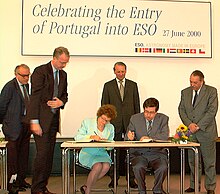Mariano Gago
José Maria Mariano Rebelo Pires Gago (born May 16, 1948 in Lisbon , † April 17, 2015 there ) was a Portuguese engineer, physicist and politician. Gago was Minister of Science in Portugal for a total of 13 years, from 1995 to 2002 under Prime Minister Guterres and from 2005 to 2011 under Prime Minister Sócrates .
Life
Mariano Gago completed his studies in electrical engineering at the Instituto Superior Técnico of the Technical University of Lisbon with the usual licenciatura . He then carried out numerous researches in the field of experimental physics of elementary particles at the École polytechnique in Paris , where he also completed his habilitation. He was a professor at the Instituto Superior Técnico, conducted research at CERN , among others , and since its founding in 1985 he has been President of the Laboratório de Instrumentação e Física Experimental de Partículas ("Laboratory for Measurement Technology and Experimental Elementary Particle Physics ") in Lisbon and Coimbra . Gago was also a member of the Joint Research Center of the European Commission (1986-1989) and was President of the Portuguese Association for Science and Technology (Junta Nacional de Investigação Científica e Tecnológica) from 1986 to 1989 , where he headed, among other things, the Portuguese funding program for science (Programa Mobilizador de Ciência e Tecnologia em Portugal) . From July 1997 to June 1998 he also chaired the European EUREKA initiative.
His political career began when Prime Minister António Guterres appointed him as the new Minister for Science, Technology and Higher Education following the Portuguese parliamentary elections in 1995 . He headed this department in both Guterres' legislative periods, hence from October 28, 1995 to October 25, 1999 ( Guterres first cabinet ) and from October 25, 1999 to April 6, 2002 ( Guterres second cabinet ). In 1998 he founded the EUREKA Asia Initiative in Macau . During the Portuguese Presidency in 2000, he prepared jointly with the European Commission , the eEurope initiative prior to the E-Government to promote within the EU. He also initiated the Ciência Viva (Living Science) program to disseminate information technology in culture and society, especially in Portugal.
After the Portuguese parliamentary elections in 2005 , Prime Minister José Sócrates reappointed Mariano Gago as Minister of Science. In his most recent tenure, Gago urged a stronger presence of the Portuguese authorities on the Internet and, in collaboration with the Ministry of Education, an adaptation of university degrees in accordance with the Bologna Process .
Although he did not belong to any party, Gago was considered to be particularly close to the Portuguese Socialists .
Mariano Gago was also a member of the Board of Directors of the International Risk Council (IRGC). He was also a member of the European Academy . Gago also published numerous works, including Manifesto for Science in Portugal (“Manifesto para a Ciência em Portugal”). In 1992 he was appointed commander of the Order of St. Jacob of the Sword .
He was married and had one daughter.
Web links
- Image. (jpg) 2013, archived from the original on April 18, 2015 .
- João de Pina-Cabral: Interview with Mariano Gago. In: Anál. Social n.200. 2011, archived from the original on April 18, 2015 (Portuguese). }
- Short biography on the website of the International Risk Council ( Memento from November 21, 2008 in the Internet Archive ) (English; PDF; 54 kB)
Individual evidence
- ^ Morreu Mariano Gago (M. Gago died). In: dnoticias.pt. April 17, 2015, Retrieved October 19, 2018 (Portuguese).
- ^ Gago, Jose Mariano P. Author profile . INSPIRE-HEP . Retrieved July 18, 2019.
- ↑ a b Por João Pedro Henriques, Ana Sá Lopes: Governo: Metade PS, metade independentes. In: Público . March 5, 2005, archived from the original on October 28 (Portuguese, government: half PS, half independents).
- ↑ Order memberships search mask. presidencia.pt, accessed October 19, 2018 (Portuguese).
| personal data | |
|---|---|
| SURNAME | Gago, Mariano |
| ALTERNATIVE NAMES | Gago, José Maria Mariano Rebelo Pires (full name) |
| BRIEF DESCRIPTION | Portuguese engineer, physicist and politician |
| DATE OF BIRTH | May 16, 1948 |
| PLACE OF BIRTH | Lisbon |
| DATE OF DEATH | 17th April 2015 |
| Place of death | Lisbon |

